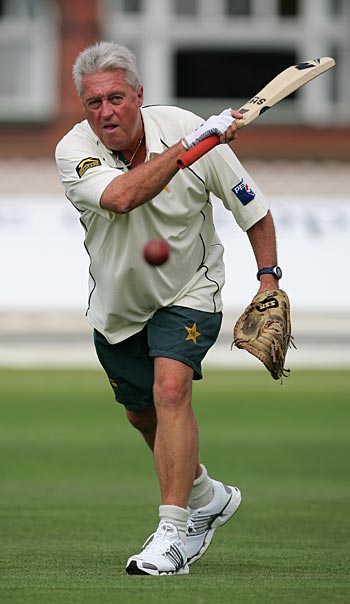
It has been over a week since Bob Woolmer, the coach of the Pakistan cricket team was declared dead after being found unconscious in his hotel room on 18th March in Kingston, Jamaica during the ICC Cricket World Cup 2007.
Initially, his death was thought to be from natural causes – he was 58 years old (which is not old these days but not young), always slightly portly, suffering from a medical condition and had type II diabetes.
However, when the post mortem proved inconclusive, the investigation stepped up a level, and his death was considered “suspicious” by the police.
This proved to be the correct line of thought, as on the same day police confirmed Bob Woolmer had been murdered
It is quite scary, because the first person I phoned was my friend Sham, and one of the first things I suggested was the possibility of underhand dealings. This was dismissed by my dad as stirring things, but it looks like my suspicions were valid.
Cricket was again making International headlines and for the wrong reasons
The History
Robert Andrew Woolmer was born in Kanpur, Uttar Pradesh, India on 14th May 1948. He moved to England as a child, and played county cricket for Kent from 1968 to 1984 scoring over 15,000 runs and taking 420 wickets at first class level. He played 19 test matches and 6 One Day Internationals for England. He saved England against the might of Lillee and Thompson’s pace bowling scoring 149 (one of his 3 test centuries), battling for 8 1/2 hours.
He was one of Wisden’s Five Cricketers of the Year in 1976.
However, like many others of that time, he chose Kerry Packer’s World Series Cricket over England to earn his living in 1977, thus shortening his playing career. He did return in 1981 but that winter chose to go on the rebel tour to South Africa (who were banned from international cricket following because of Apartheid).
Woolmer settled in South Africa, married and fathered 2 children. He continued to be involved in sport, having already done coaching at a school in Kent as a physical education teacher (aged 22), after becoming a qualified coach in 1968.
He coached a coloured Hockey team and the Avendale Cricket Club in Athlone, Cape Town before returning to England in 1987 to coach County Cricket teams. The most recent being his stint at Warwickshire between 1991 and 1994.
He was an innovative coach, choosing to use computers and video footage where it had not been used before. He encouraged the use of the sweep and reverse sweep shots. Fitness and fielding were vital to one day cricket, and it was in these fields where he made Warwickshire a very tough team to beat even though only their 1 overseas player was regularly playing international cricket. They won the Natwest Trophy in 1993 and 3 of the 4 available trophies in 1994.
From this success he was offered the position of coach of the South African national cricket team, following their return to international cricket in 1991 with the abolition of apartheid & Nelson Mandela’s new ANC government.
Woolmer hastened their return, and within 2 years they were competing with the very best teams in the world. This was impressive, since they had been banned from international cricket for 21 years.
The team that toured England in 1994 with Woolmer as coach made big names of Allan Donald, Shaun Pollock, Jonathan ‘Jonty’ Rhodes, Wessel ‘Hansie’ Cronje, and Gary Kirsten. South Africa soon overtook all but Australia in the international team ranking to become 2nd in the world.
Woolmer remained coach until 1999, and was hotly tipped to take over as coach of England to replace David Lloyd. But he declined for various reasons, and instead took up a position as Head of Performance at the ICC where he promoted associate member nations to improve the standard of cricket in countries such as Ireland, Kenya, Nepal, Scotland, USA, Bermuda, Bangladesh, UAE to name but a few.
His contract had not finished when in 2004 he was approached by the Pakistan Cricket board to coach the national team amidst a down in form and problematic team selection. Woolmer relished the challenge, and the ICC agreed to release him from their contract to pursue this.
He had moderate success in what is well known to be the most difficult side to coach.
On 17th March 2007 Pakistan made a shock exit from the Cricket World Cup losing to Ireland in the group stage. On the same day, India lost to Bangladesh putting their World Cup future in doubt.
Woolmer said in the press conference “It’s only a game” and that he would sleep on his coaching future as his contract renewal would be discussed at the end of the world cup. Being knocked out so early it would be unlikely for it to be renewed, and sources also claimed he had decided to call it quits after the competition.
The next morning, at 10:45am in room 374 of the Pegasus hotel, Bob Woolmer was found unconscious, he was taken to the nearby University Hospital and shortly pronounced dead.
The cricket world was in shock, and the pakistan team were struck a double blow when 3 days later it would be confirmed that their coach was murdered, and his death was caused by asphyxiation following strangulation. There was also suspicion that he was drugged/poisoned.
Players, Administrators, friends and fans across the world have paid tribute, and many matches since the news have been played with black armbands worn in respect.
Allan Donald, who probably knew Woolmer best, called for the tournament to be called off. But this opinion has not been supported by others
The Bob Woolmer Academy is due to be built in Nelspruit, South Africa despite his death.
However, this all begs the question, who would want to murder Bob Woolmer and why? Which leads to…
…The Controversies
I’ve glossed over these in the history, as it is probably better to group them together in their own section.
1. Match Fixing
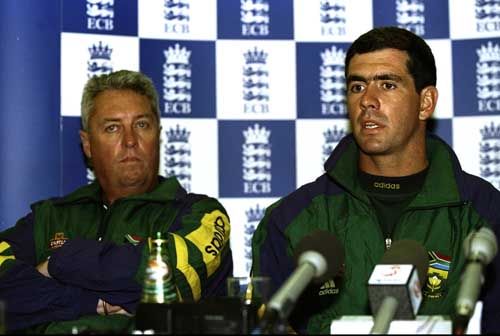
The first was probably the match fixing scandal in 2000
It rocked South African and International cricket when the South African captain, Hansie Cronje confessed in April 2000 that he had accepted money to either fix matches and/or ensure bowlers gave away a certain number of runs or that batsmen scored less than a certain amount. The news coming from Cronje, a devout christian and follower of the What Would Jesus Do (WWJD) movement was a shock the world over. Working with the authorities, many players were banned, including Cronje himself. The bookmakers are thought to largely remain at large around the world. As a consequence of the scandal, the ICC set up an anti corruption unit to ensure it never happens again and that match results are not compromised.
Several matches not involving South Africa are largely thought to have been fixed, often involving India and Pakistan, where there is a lot of money to be made from gambling. Some of the bookmakers involved with Cronje were from India and Pakistan.
The group B match between Pakistan and Bangladesh in the 1999 World Cup in England is thought to have been fixed for Bangladesh to win. Pakistan had qualified for the next stage regardless of the result. With Bangladesh winning, their promotion to playing international test cricket was speeded up significantly.
Was the match between Pakistan and Ireland a fix? Did Bob Woolmer find out about it when he shouldn’t have known?
2. Drug Taking
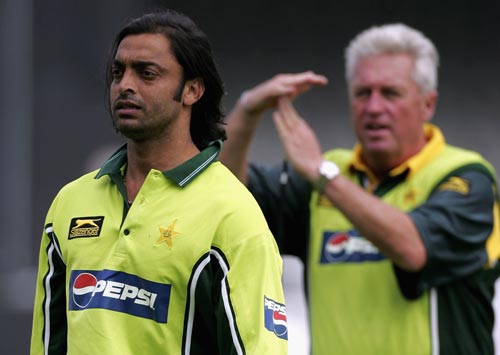
In November 2006, just before the ICC Champions Trophy, the Pakistan Team management, allegedly led by Bob Woolmer enforced a mandatory drugs test on all their players. Shoaib Akhtar and Mohammed Asif, the two key Opening bowlers tested positive for Nandrolone, an Anabolic Steroid banned by the World Anti Doping Agency (WADA) and the International Olympic Committee (IOC). Following the tests they were pulled from the Champions Trophy squads and hauled over for disciplining. Shoaib was banned for 2 years and Asif for one year… but they both contested the ban claiming they had taken it accidentally in herbel supplements from a Hakim and that they were unaware of the substances they were taking. The appeal was heard, and a month later, the bans were removed and both players were available for selection.
The true story is probably that Bob Woolmer and his coaching staff in addition to the players were well aware of what they were taking. The ICC competitions have much more stringent rules than other tournaments. Rather than having any of their important players caught in a random drugs test during the competition, the management took it on themselves to test everyone and deal without involving the ICC. Once the players were disciplined, they could then appeal and the punishment could be reduced or even reversed.
This did not go down well with the authorities, and the ICC and WADA will probably review their policies to prevent teams and cricket boards from doing this in the future.
3. Ball Tampering… and Darryl Hair
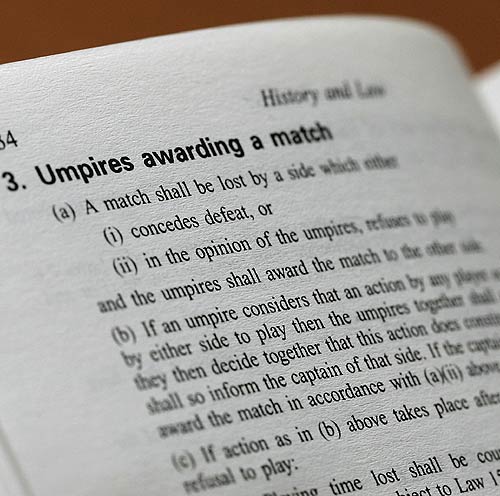
The Summer before the drugs was the debacle in England at the end of the 4th Test
For the first time in the history of test cricket a match was awarded because a side refused to take the field. I was at the ground that day at the Oval.
Daryl Hair, a controversial umpire for which I could write an entire blog entry on what he’s done in his career to stir & muddy the waters, accused the pakistan team of tampering with the ball. Ball tampering is banned under the laws of cricket under law 42 subsection 3.
The Pakistan captain, Inzamam-ul-Haq was horrified, so too was Bob Woolmer. When the team were due to resume after the break for tea, the team staged a sit in.
Daryl hair played the scenario by the book and went out to the middle with the England batsmen, waited 10 minutes, removed the bails and led the batsmen off. In doing this, he was calling the game off and awarding it to England.
15 minutes later, the entire Pakistan team came out, but this time the Umpires refused to play.
The whole scenario was a debacle, of which didn’t improve when Daryl hair trying to blackmail the ICC to be silenced.
There was a hearing which concluded there was no ball tampering, the pakistan captain was disciplined and Daryl Hair has been removed from the elite panel of umpires, and will more than likely not umpire an international game again.
4. The Book
The final controversy was not in the news until after Woolmer died, because the day after his death, the 600 page manuscript of the book he had been writing with co-author and sports scientist, Tim Noakes. In an article in the guardian and on the radio, Noakes has repeatedly stated that the word “match fixing” is not mentioned in the manuscript and there is nothing that would ‘blow the lid’ and could provoke someone to murder Bob Woolmer.
Noakes said:
There is absolutely no truth in that story, besides, how could anyone know what’s in the book, nobody in Pakistan could possibly have seen it. The only secret Bob was revealing in the book was how to coach cricketers properly
 Sven-Göran Eriksson
Sven-Göran Eriksson Steve Mclaren
Steve Mclaren Andy Robinson
Andy Robinson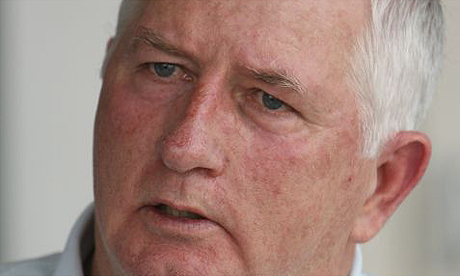 Duncan Fletcher
Duncan Fletcher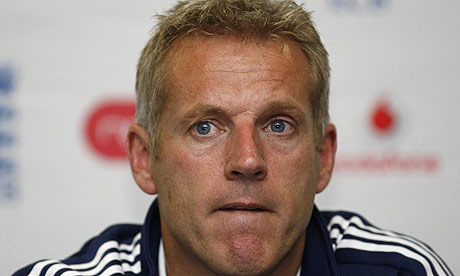 Peter Moores
Peter Moores






